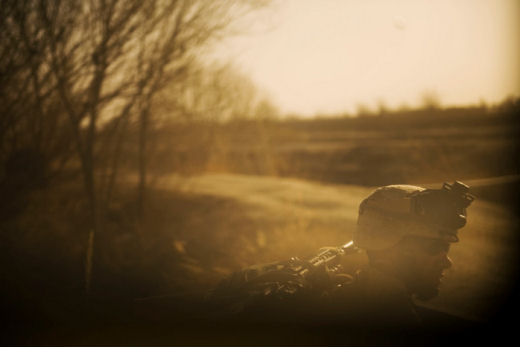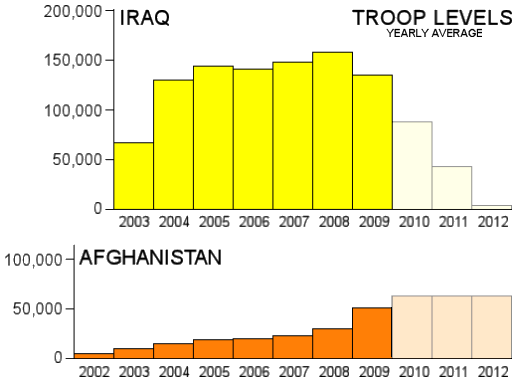
Four NATO troops killed on sixth day of Marja offensive in Afghanistan
Washington Post
by Joshua Partlow
February 19, 2010KABUL – The sixth day of the military offensive in southern Afghanistan proved the deadliest so far as four NATO troops were killed in bombings and gun battles during the painstaking push to take back a Taliban stronghold. From the beginning of the operation in Marja — the biggest joint military operation of the war – coalition troops have encountered sporadic gunfire and a host of roadside bombs, many detected before they could cause damage or injury. But the Taliban resistance has appeared to intensify rather than diminish as U.S. Marines and Afghan soldiers have taken control of key roads, bridges and the defunct government center.
The top military commander in southern Afghanistan, British Maj. Gen. Nick Carter, said that the operation had reached the "end of the beginning" but that it would take about a month to be sure "we have secured that which needs to be secured." Three of the four deaths Thursday came in two separate roadside bombings; the fourth service member was killed by small-arms fire. The deaths brought the toll for the Marja offensive to at least nine NATO troops and one Afghan soldier. NATO did not release the nationalities of those killed Thursday, but a British soldier was among those who died.
The operation in Marja is intended not only to push out the Taliban but also to install a local government and Afghan security force where there have long been none. The pace has been slowed by regular insurgent attacks and the prevalence of mines and bombs, which can make moving even short distances an undertaking of hours…

I feel a little bit like the kid I was during the Korean War – playing with plastic soldiers and cutting out pictures of fighter planes. It was soon after WWII when war was still heroic and it hadn’t occurred to anyone that it was possible to think otherwise. That came in Viet Nam. I’m almost rah-rah about the Afghanistan War, at least about the Taliban part.
… that does not allow politics or political parties. That is why we give no salaries to officials or soldiers, just food, clothes, shoes and weapons. We want to live a life like the Prophet lived 1400 years ago and jihad is our right. We want to recreate the time of the Prophet and we are only carrying out what the Afghan people have wanted for the past 14 years.
Under the Taliban regime, Sharia law was interpreted to ban a wide variety of activities hitherto lawful in Afghanistan: employment, education and sports for women, movies, television, videos, music, dancing, hanging pictures in homes, clapping during sports events, kite flying, and beard trimming. One Taliban list of prohibitions included:pork, pig, pig oil, anything made from human hair, satellite dishes, cinematography, and equipment that produces the joy of music, pool tables, chess, masks, alcohol, tapes, computers, VCRs, television, anything that propagates sex and is full of music, wine, lobster, nail polish, firecrackers, statues, sewing catalogs, pictures, Christmas cards.
Men were required to have a beard extending farther than a fist clamped at the base of the chin. On the other hand, they had to wear their head hair short. Men were also required to wear a head covering. Possession was forbidden of depictions of living things, whether drawings, paintings or photographs, stuffed animals, and dolls. These rules were issued by the Ministry for the Promotion of Virtue and Suppression of Vice [PVSV] and enforced by its "religious police," a concept thought to be borrowed from the Wahhabis. In newly conquered towns hundreds of religious police beat offenders [typically men without beards and women who were not wearing their burqas properly] with long stick. Theft was punished by the amputation of a hand, rape and murder by public execution. Married adulterers were stoned to death. In Kabul, punishments were carried out in front of crowds in the city’s former soccer stadium.
Sorry, the comment form is closed at this time.